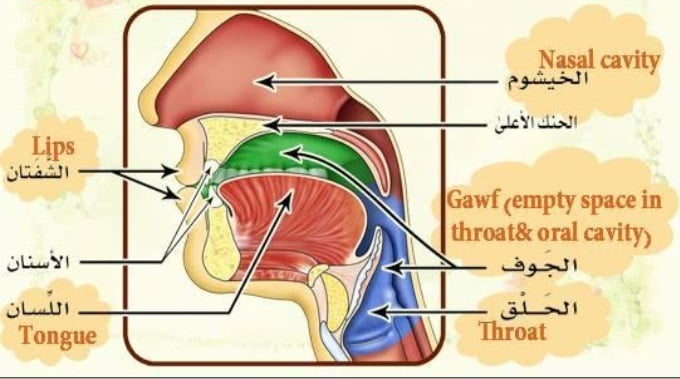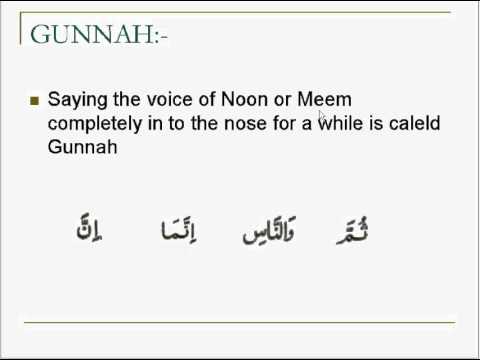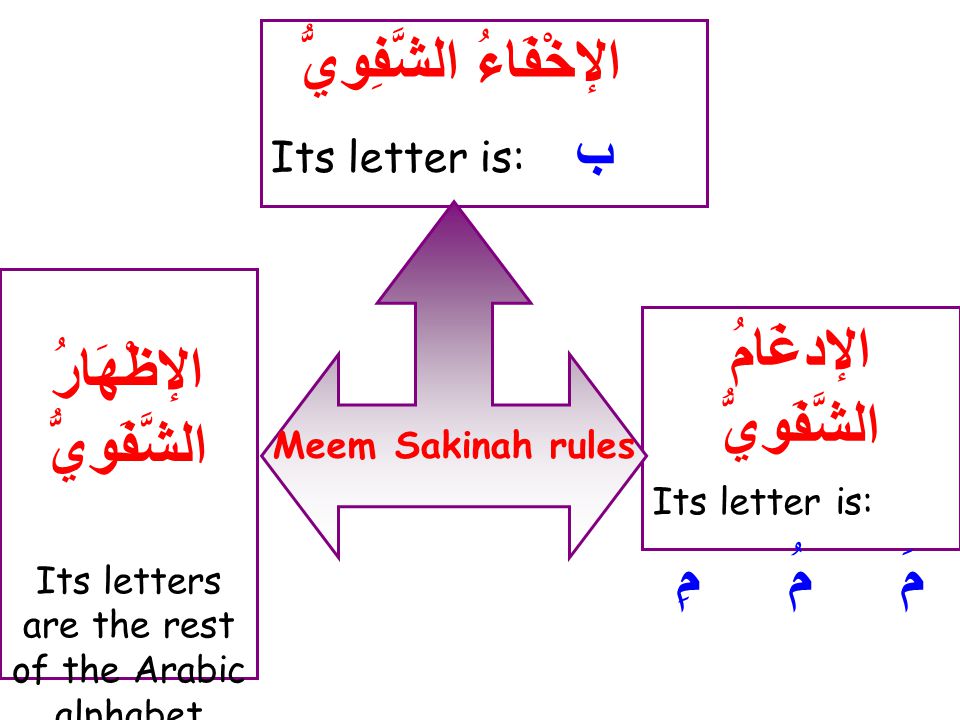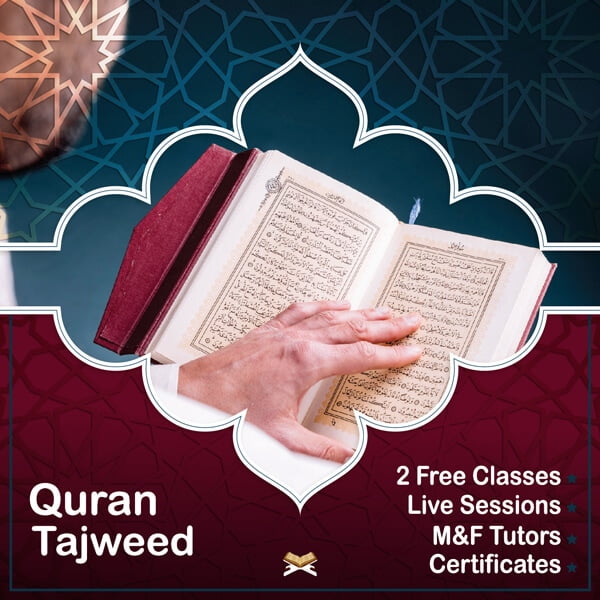Undoubtedly recitation of the Holy Quran is one of the best ways for a Muslim to get closer to Allah (SWT). Accordingly, learn Quran recitation with Tajweed is an act of faith itself that brings you many good deeds and virtues.
Since the last divined book was revealed in a clear Arabic tongue, it is necessary that Quran recitation agrees with the manner transmitted from the messenger of Allah Muhammad (PBUH) from the aspect of articulation points and transient characteristics of the letters.
In this article, we’ll learn about Quran recitation with Tajweed, its importance, and top Tajweed rules.
What Does “Quran Recitation with Tajweed” Mean?
Reciting the Holy Quran with Tajweed refers to applying certain rules upon pronouncing each letter in Quran recitation (Tilawa). These rules are the different linguistic, lexical, phonetic, morphological, and syntactical forms that should be applied to read Quran correctly as reported by the prophet Muhammad (PBUH).
Accordingly, we can define the Tajweed (Tajwid) as the set of rules for correct pronunciation of the Quranic letters with all their qualities and applying the various traditional methods of recitation, giving every letter its rights and dues as well as stoppings and startings.
Moreover, the word “Tajweed“ is actually an Arabic word (تجويد) that mean “enhancement”, “to perfect something”, or “to make beauty in reciting Quran”.
The prophet Muhammad said:
Make your voices beautiful when you recite Quran.
Hadith [Sunan an-Nasa’i 1015]
Importance of Tajweed
From the definition of Tajweed, it’s impossible not to realize the great importance of Tajweed in Quran recitation.
The Quran recitation must be infallible without any linguistic and verbal errors. It should follow fixed and regular rules of reading for all people at all times.
By following the Quran recitation with Tajweed rules, the Qur’an is distinguished from all other readings like prose, poetry, and rhetoric.
The correct pronunciation of words and letters, and adherence to signs of pausing, initiation, glorification, and thinning, all lead to further reflection on the verses of the Qur’an.
Moreover, beautifying Tilawat by applying Quran Tajweed rules endeavors giving our souls a feeling of prestige, reverence, and softness of heart for the verses of the Wise Remembrance.
Sign up for our newsletter
Get the latest offers, articles, and courses delivered to your inbox.
Immerse yourself in the beauty of Qirat Quran! Discover the power of recitation, deepen your connection, and enrich your soul.
Join us to explore authentic Qirat styles, enhance your recitation skills, and experience the profound impact of the Quran’s verses. Start your journey with us today, and let the beauty of Qirat fill your heart and mind!
Quran Tajweed Rules
As we mentioned earlier, there are many rules of Tajweed that preserve Quran recitation with the best quality.
The top Tajweed Quran rules you should learn are…
1. The Articulation Points

The first and most important rule in learning Quran recitation with Tajweed is the articulation points of letters.
As we also said before this book was revealed in a clear Arabic tongue. So we have to first learn the Arabic language to help us understand the Holy Quran and recite it properly.
The articulation point refers to the place of emitting the letters when pronouncing them which differentiates the specific letter from another one.
The scholars laid out the following five major areas that have within them the different articulation points:
- The Oral Cavity – the empty space in the mouth and throat has in it one articulation point for the three lengthened letters.
- The Throat – it has three articulation points for six different letters which are pronounced from the deepest, middle, and closest part of the throat.
- The Two Lips – they have two articulation points for four letters.
- The Tongue – it has ten articulation points for eighteen letters.
- The Nose – from the holes of the nose towards the inside of the mouth, here is one articulation point, that of the Ghunnah.
Enhance your prayer experience. learn to read Quran with confidence.
2. The Ghunnah

“The Ghunnah“ is one of the most important Tajweed rules which linguistically means the sound that is emitted from the nasal passage, without any function of the tongue.
When applied to the Tajweed of Quran, “The Ghunnah” refers to the unconditional nasalized sound fixed on the “Noon” letter even if it is a “TANWEEN” and “MEEM”.
This means that the “Ghunnah” is an inherent sound in the “MEEM” and “NOON”, whether the “NOON” and “MEEM” have a vowel or not.
So there are 2 letters of the Ghunnah: the “NOON” and the “MEEM”. The “NOON” includes the “TANWEEN”.
The articulation point of the Ghunnah is at the opening of the nose that connects with the back of the mouth (the nasal passage).
Quran Oasis Academy: Your Gateway to Quranic Mastery Learn Quran Online with our expert instructors.
Enroll Now and embark on a transformative journey of spiritual growth and understanding.
Limited spots available!
3. Noon Sakinah & Tanween

Noon Sakinah and Tanween are some of the most common tajweed rules.
“NOON SAKINAH“ is noon free from any vowel. It remains unchanged in its written form and as well as in pronunciation when continuing to read after it and when stopping on it. “NOON SAAKINAH” occurs in nouns and verbs in the middle of the word and at the end of the word, and occurs in prepositions and particles only at the end of the word. The NOON SAKINAH can have a SUKOON on it or can be written with no vowel on it.
“TANWEEN” is a term for an extra NOON SAKINAH not used for emphasis, found at the end of nouns when continuing the reading but absent from the noun in the written front (the noon of the TANWEEN is pronounced but not written), and abandoned in pronunciation when stopping.
There are four rules of “TANWEEN” applied to both the “NOON SAKINAH” & “TANWEEN”. These 4 rules are:
- Izhar – the NOON sound is pronounced clearly without additional modifications when followed by letters of the throat.
- Iqlab – refers to the changing of “NOON SAKINAH” or the “TANWEEN” into a “MEEM”, when followed by a “BA’A” with the observance of the “Ghunnah”, and hiding of the “MEEM”.
- Idgham – refers to the meeting of a non-voweled letter with a voweled letter, so that the two letters become one emphasized letter of the second type.
- Ikhfaa – refers to the pronunciation of a non-voweled letter stripped of any Shaddah, characterized somewhere between an Izhar and Idgham with a Ghunnah remaining on the first letter, in this case, the NOON SAKINAH and the TANWEEN.
4. Meem Sakinah

As same as “NOON SAKINAH” before it’s a “MEEM” free from any vowel, and which has a fixed “SUKOON” when continuing reading and when stopping.
This excludes the “MEEM” that was original without a vowel but obtained one because the next letter also had a “SUKOON”. In the Arabic language, it’s not allowed to have two non-voweled letters next to each other; one will automatically obtain a vowel to eliminate this problem.
The “MEEM SAKINAH” has three possible conditions:
- Oral Ikhfaa
- Oral Izhar
- Idgham with Ghunnah
As we mentioned, there are a lot of Tajweed rules to master learning the Quran with Tajweed, more than we can cover in full. And what is worth noting is that even if we could this kind of knowledge needs a Quran teacher, not anyone, but experts.
Unlock the beauty of Quranic recitation with our Quran Tajweed Course. Whether you’re a beginner or looking to perfect your recitation, our course will guide you step by step through the rules of Tajweed Quran. Gain confidence in your recitation, understand the significance of proper pronunciation, and connect deeply with the Holy Quran.
Start your journey to mastering Tajweed Quran today and elevate your recitation to a whole new level!
How to learn Quran Recitation with Tajweed?
If you decided to learn Quran recitation with Tajweed for your or your kids, then the best and trending method to achieve your goal is to learn Quran online at Quran Oasis with highly-qualified and native Quran tutors. Our teachers walk with you or your kids step-by-step from learning Quran reading basics to mastering Quran recitation with tajweed, and even more obtaining Ijazah in Quran recitation.
The beauty of the matter is that the Internet has made the world a small room, and by it, we no longer have to travel to learn, where there is what is called “online Quran learning”. So now, we can at anytime from anywhere in the world learn Quran with Tajweed.
Hereunder is how you can learn Quran Recitation with Tajweed in 3 steps…
Take the First Step – Learn Quran From the Comfort of Your Home
STEP 1: LEARN QURAN READING BASICS

Reading the Quran Basics course is your first step towards mastering Quran recitation with Tajweed. In this course, you and your children also will learn how to read Arabic and Quranic letters properly.
It is important to know that Arabic provides diacritics. Diacritics tell you how to read Arabic words so you do not need to memorize their pronouncing. You will also learn how Arabic letters are linked together or separated, how to read words, then short sentences and long sentences. Moreover, you will be able to read Arabic supplications.
Are you eager to learn Quran with Tajweed and enhance your recitation? Start your journey today with our expert tips! Whether you’re a complete beginner or just looking to improve, these practical steps will guide you toward mastering the art of Tajweed. Don’t wait—unlock the beauty of perfect Quranic pronunciation!
Start now and learn Quran with Tajweed to deepen your connection with the words of Allah.
STEP 2: LEARN QURAN RECITATION

In this course, you will recite all of the Holy Quran. You will learn how to correctly recite it in the way as reported by the Prophet Muhammad (peace be upon him). You will start from the short Surahs to the longest ones.
In the Reading Quran Basics course, your teacher also will train you on the Quran phonetics. He/She will qualify you to master reading the small Quranic Surahs.
STEP 3: LEARN QURAN TAJWEED

The correct recitation, as a result, requires learning and applying the Quran Tajweed through your recitation.
In this Tajweed course, you will learn the rules of Tajweed, starting from the principles of recitation to the characteristics and Quran letters articulation. You will learn all of this and more through lessons full of examples from the Quran and accompanied by the practical recitation of the Holy Quran.
Do you want your kids to learn more about Online Quran Classes? Sign up for Quran Oasis’s Online Quran Classes program and watch them dive deeper into the Quran science and learn the Holy Book of Allah.
Quran Oasis’s online Arabic classes for kids, Quran classes for adults and let your children learn the accurate Quran recitation and word pronunciation even if Arabic is not their first language.
Quran teaching for children in Quran Oasis is fun as well as structured, they’ll learn with eLearning Quran;
Our Quran teacher, Arabic teacher, Islamic Studies teacher, tajweed teacher, ( House of Quran ) will be their friends during this amazing journey.
Online Quran tuition learning can be challenging if you’re seeking it for your kids. Quran Oasis offers you a wide variety of topics to teach your children online.
Quran Oasis’s experienced live tutor ( male teacher & female teacher ). They have many years of experience in Teaching Arabic online and Quran online to non-Arabic speakers.
Whether it’s Quran online, Arabic online, Tajweed, Ijazah, tafsir, Qirat, tajwid al Quran, and Islamic Studies. Quran Oasis has your back with professional Quran tutors who are willing to go further with your kids’ education. With an attractive interface and well-structured lessons,
Quran Oasis gives you and your children the chance to learn with Quran ayat who are going to be your kids’ new friends, accompanying them in their learning process and encouraging them to learn more.
Quran Oasis an ( online Quran institute ) is the best Quran class online
Read More…
Are you seeking to instill the profound teachings of the Quran in your children’s lives? Look no further! Join us Quran oasis in this noble endeavor as we embark on a transformative path together.
The Quran is not merely a book; it is a guiding light, a source of solace, and a roadmap for life’s journey. As parents, it is our sacred duty to impart its timeless lessons to our children, shaping them into compassionate, righteous individuals.
Imagine the joy of witnessing your child’s eyes light up as they recite the verses of surah Al Qadr with eloquence and devotion. This chapter, which heralds the revelation of the Quran, holds immense significance, reminding us of the power of faith and the blessings of knowledge.
At َQuran oasis, we understand the importance of nurturing young minds in the embrace of the Quran. Our dedicated team of educators and mentors are committed to providing a nurturing environment where your children can thrive spiritually and academically.
Join us in this noble journey of faith and knowledge. Together, let us empower our children to become leaders in reciting surah Al Qadr and embodying its timeless message of hope, guidance, and divine grace.
Take the first step towards a brighter future for your child. Enroll with us today and witness the transformative power of the Holy Quran in their lives.
May Allah bless our efforts and guide us on this sacred path.
Unlock the Divine Beauty of Quran Recitation!
Master the art of Quran Tajweed and elevate your recitation to new heights. Our expert-guided program helps you perfect your pronunciation, rhythm, and melodic flow—just as the Prophet Muhammad (peace be upon him) taught.
✨ Why Start Your Quran Tajweed Journey Today? ✨
- Learn proper Arabic pronunciation
- Understand essential recitation rules
- Gain confidence in your Quran reading
- Earn rewards for correct recitation
- Join a supportive learning community
Don’t wait to enhance your connection with the Quran. Take the first step toward mastering Quran Tajweed today!
🌟 SPECIAL OFFER: Get your first lesson FREE! 🌟
Click here to begin your Quran Tajweed journey

